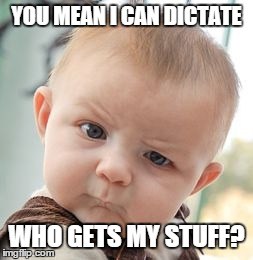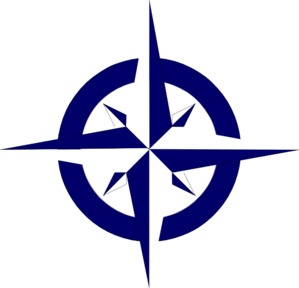
I am the Dawn of the end of his life. At least that’s what my dad says. My name is Dawn Brock and I am the youngest of E. Lawrence Brock’s children. For as long as I can remember my dad has had his own law office in Chino, California. The office has been as much a part of my life as living in my house. I visited the office long before I ever started working there. When I was little, if my dad forgot something at work I would go back with him to retrieve it. When I got older, I started working there as the cleaning lady. Slowly, I gained more responsibility until I became a secretary. So many memories include that office and going to there has always been an important part of my life.
My dad has always been my amazing father, but he has also always been a lawyer. He never explicitly stated to us children that protecting our assets and having an Estate Plan was important. However, by watching him work and how he deals with his clients showed it to be an important truth.
For the longest time, I didn’t know what an Estate Plan encompassed, but I knew its importance. I knew it had something to do with protecting your assets after you died and distributing your valuables to those you wanted to receive them. However, I didn’t know the extent of what an Estate Plan does for you. Now, after years of working for my father, I have a limited knowledge of what an Estate Plan entails. I can’t explain it in any official capacity but maybe my simplistic view can shed some light on what may appear as a complicated process.
First, an Estate Plan is more than just one document. It is a group of documents that together protect you more completely than just a Will or Trust alone. The documents include a Trust, a Pour-Over Will, a General Power of Attorney, an Advanced Health Care, the HIPAA, and the Assignment of Personal Property. These main documents make up the contents of most Estate Plans. Each aspect of the Estate Plan does something different, but as a whole, they all work together to give you the greatest protection possible.
The Trust, the largest document, explains where all your assets go and who gets what after you pass away. The Pour-Over Will is, in essence, extra insurance for any assets not in the trust. It states that anything you own not already in the Trust will be distributed by or pored over into the Trust. The Power of Attorney is the document that explains who will be in charge of decisions for you when you are no longer able to make sound decisions. The Advanced Health Care tells the doctors how long to or not to keep you on life support and other medical procedures. The HIPAA tells the doctors who you have allowed access your medical records. Finally, the Assignment of Personal Property is the document that gives you the ability to give specific assets to specific people.
People might wonder why there needs to be so much detail in an Estate Plan. Why can’t they just write a will stating this person gets this and that’s all? Even though that sounds simpler, in the end, it isn’t. If you create a Will in that manner most likely something will be forgotten. That one forgotten thing can create a wedge that will leave an estate in Probate for years. As the daughter of an Estate Planning attorney, I think it is easier to contest a document with vague wording, rather than a set of documents that all work together to create a secure future for your assets and your legacy.
 Imagine, one year your child wants a pool party to celebrate their birthday. A day of swimming and playing in the water sounds fun and harmless so you agree. The invites sent, every child in the neighborhood eagerly awaits the party. When the day arrives everything seems to be going according to plan. The children are having a blast in the pool and laughter is abounding. You step inside to grab the cake when you hear a crash and the sound of a child crying. Rushing back outside you find a neighbor boy has slipped on the wet concrete and appears to have injured his arm. Concerned, his parents rush him to the hospital where they discover he broke his arm. Within a week, papers are delivered to your door. The boy’s parents have filed a lawsuit against you and are now suing you for medical expenses.
Imagine, one year your child wants a pool party to celebrate their birthday. A day of swimming and playing in the water sounds fun and harmless so you agree. The invites sent, every child in the neighborhood eagerly awaits the party. When the day arrives everything seems to be going according to plan. The children are having a blast in the pool and laughter is abounding. You step inside to grab the cake when you hear a crash and the sound of a child crying. Rushing back outside you find a neighbor boy has slipped on the wet concrete and appears to have injured his arm. Concerned, his parents rush him to the hospital where they discover he broke his arm. Within a week, papers are delivered to your door. The boy’s parents have filed a lawsuit against you and are now suing you for medical expenses. Heat radiates from the flames spreading across the open field. The firemen rush to contain the fire. It has already consumed much of the landscape in its path. Despite gallons of water dropped on the flames, they continue to grow. The situation continues to go from bad to worse. Miles away a family sits watching the horror unfold on the evening news, a fire burning safely in their fire place. This fire provides warmth and a sense of security. The family watches as finally, the firemen contain the flames but it is too late; the damage done, most of the field is lost.
Heat radiates from the flames spreading across the open field. The firemen rush to contain the fire. It has already consumed much of the landscape in its path. Despite gallons of water dropped on the flames, they continue to grow. The situation continues to go from bad to worse. Miles away a family sits watching the horror unfold on the evening news, a fire burning safely in their fire place. This fire provides warmth and a sense of security. The family watches as finally, the firemen contain the flames but it is too late; the damage done, most of the field is lost. Divorce is never thought about at the beginning of a marriage. However, situations arise that may lead your child to seek a divorce. If that happens you don’t want your child’s inheritance to end up with your son or daughter-in-law. With out the proper planning, that may happen. Without the correct documents prepared appropriately, the gifts you leave your child may end up with their spouse. Developing or designing an Estate Plan where it stays with your child and grandchildren is possible.
Divorce is never thought about at the beginning of a marriage. However, situations arise that may lead your child to seek a divorce. If that happens you don’t want your child’s inheritance to end up with your son or daughter-in-law. With out the proper planning, that may happen. Without the correct documents prepared appropriately, the gifts you leave your child may end up with their spouse. Developing or designing an Estate Plan where it stays with your child and grandchildren is possible. I have a horrible sense of direction. I truly do. When I first learned how to drive I got lost almost every time I went someplace new. I would even look up directions to places only a few blocks away. Then I would print out those directions, and take them with me. I did this because I knew I was terrible at remembering directions. I had to really learn to pay attention. It took a while but eventually my sense of direction improved. I have learned how to identify major streets and follow patterns in different neighborhoods. I still get lost occasionally. However, now I have an easier time finding my way again. Just like how I needed directions for the road some people need directions for their lives.
I have a horrible sense of direction. I truly do. When I first learned how to drive I got lost almost every time I went someplace new. I would even look up directions to places only a few blocks away. Then I would print out those directions, and take them with me. I did this because I knew I was terrible at remembering directions. I had to really learn to pay attention. It took a while but eventually my sense of direction improved. I have learned how to identify major streets and follow patterns in different neighborhoods. I still get lost occasionally. However, now I have an easier time finding my way again. Just like how I needed directions for the road some people need directions for their lives. You look down and notice the little flashing light on your phone. Suddenly your focus has shifted from your task at hand to finding your charger so your phone doesn’t die. In many ways, you are the charger of your family. Yes, your children go out into the world and live their lives, but occasionally they come home. You provide them with a sense of comfort and infinite strength that is hard to find outside the home. Just as your charger gives your phone battery strength, you
You look down and notice the little flashing light on your phone. Suddenly your focus has shifted from your task at hand to finding your charger so your phone doesn’t die. In many ways, you are the charger of your family. Yes, your children go out into the world and live their lives, but occasionally they come home. You provide them with a sense of comfort and infinite strength that is hard to find outside the home. Just as your charger gives your phone battery strength, you The short answer: yes. I have changed so much throughout the years and I have watched those I love change as well. I haven’t just changed from being a child to a teenager to an adult. There have been moments of growth and change throughout my entire life. New experiences happen daily and help me to learn and grow. I make mistakes, especially when I don’t fully understand what is happening around me. Those mistakes have helped me become a better person. While change is not always pleasant, such as losing a loved one, it is a necessary part of life. And with the change of death, your children will have to deal with the legal ramifications of the situation.
The short answer: yes. I have changed so much throughout the years and I have watched those I love change as well. I haven’t just changed from being a child to a teenager to an adult. There have been moments of growth and change throughout my entire life. New experiences happen daily and help me to learn and grow. I make mistakes, especially when I don’t fully understand what is happening around me. Those mistakes have helped me become a better person. While change is not always pleasant, such as losing a loved one, it is a necessary part of life. And with the change of death, your children will have to deal with the legal ramifications of the situation.
 A detailed Estate Plan can help navigate the turbulent waters that inevitably come for everyone. Nothing can prevent death, but it is possible to help make the transition easier for those who are left behind.
A detailed Estate Plan can help navigate the turbulent waters that inevitably come for everyone. Nothing can prevent death, but it is possible to help make the transition easier for those who are left behind. One of the main reasons for Estate Planning, particularly if you have minor children, is to designate guardians. You have to decide who will care for your children if you both pass away. An Estate Plan allows you to do more than choosing who can provide for your children. It allows you to designate those you don’t want to have guardianship of your children.
One of the main reasons for Estate Planning, particularly if you have minor children, is to designate guardians. You have to decide who will care for your children if you both pass away. An Estate Plan allows you to do more than choosing who can provide for your children. It allows you to designate those you don’t want to have guardianship of your children. Unfortunately, sometimes there is a falling out between someone you love and yourself. While never expected, never planned, and never an easy experience, these situations still arise. Rifts form between people and
Unfortunately, sometimes there is a falling out between someone you love and yourself. While never expected, never planned, and never an easy experience, these situations still arise. Rifts form between people and